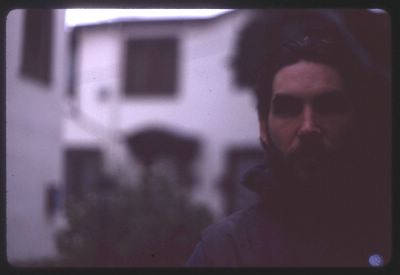
"Arlie Carstens Outside."
1. I’ve read that you’ve moved from
I needed a break from
It’s nice to be living somewhere else for a while. Many of my friends from around the country now live in
2. How is it been for you to not be in a band and to get out of the touring\recording\touring scheme that dominates just about any band’s life span?
That’s been tough at times because I enjoy touring and Juno toured a lot. It’s a good way to build and maintain friendships, and experience different perspectives on social and political issues. As well, just being around music and talking with other musicians can inspire the creative process. But oh well, things change. In order for Ghost Wars to happen I had to get out of familiar surroundings and routines. Leaving all that behind for awhile has given me room to approach this next project in new and different ways.
3. I’ve read your reviews of records on various magazines – did it came from a desire to share your thoughts on records and is it something you’re willing to keep on doing?
I love listening to music, and I make music- so, as part of my freelance work I occasionally write music reviews. But I’m not at all interested in being a music critic, if that is what you’re wondering. Most music critics seem kind of bored with music, or worse, spiteful of the efforts of those who make music. Generally, I try to write about things that I enjoy listening to and that I’d be happy to recommend to other people.
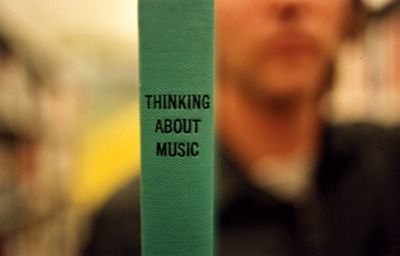
"Thinking About Music." Ghost Wars, 2005.
4.Reading the Juno website updates is always been to me a part of what your band was about – and seeing how articulate and diverse the updates were – have you ever had the desire to write something that has to do with fiction in anyway?
I grew up thinking I was going to be a writer; at least, that’s what I thought I wanted to be. And then in my teens I fell in love with punk and experimental music. So for me, music and writing have just always gone together. I’m interested in life and all the things that happen to people while they’re here. Writing about it somehow seems to help me make sense of it. Which may explain why the Juno updates are the way they are, and also may explain why our songs read more like stories than traditional verse/chorus/verse forms.
Recently, I was accepted to a creative writing program at a grad school in
5. I think that your lyric writing approach with Juno was very clear – despite the lyrics being about various subjects – how did you achieve it? What were the elements that you found important in writing lyrics?
The elements? People, places, politics, history, literature, jokes, music, and various experiences good and bad. I write lyrics in attempt to make sense of life and paint pictures of events and emotions; to tell the stories of the lives of people I’ve known and have cared about. Especially the stories of the people I miss, many of whom are gone and who can no longer relay the stories themselves. Despite how discarded some of us feel and regardless of how fucked up the world is, all of our lives matter. We can either fall into darkness and fear or we can build community and love one another. Music, much as it breaks my heart, it gives me hope. That’s pretty much it. Lyrics are my way of chronicling our lives, honouring my dead, and keeping the memory of past events, people and places close to my heart.
But toward the end, while some of us were excited to keep making songs and touring, others became unsure of what they wanted to do in their personal and artistic lives. The routine of practicing, touring, finding money to record, and dealing with setbacks can wear people out. Which is totally valid. Living the life of a full-time musician is hard, especially when working on an independent level and only having each other for motivation every day. Still, we’re all friends. Gabe, Greg and I occasionally talk about if/when we’ll complete the third Juno album. It might happen, it might not. Either way, we’re all appreciative and proud of our time together.
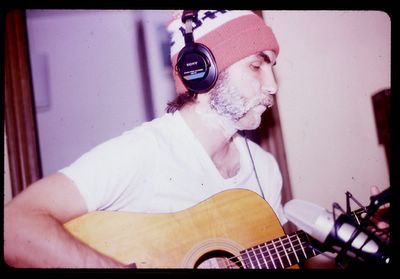
“ACBeardo." Taking a time out from shaving to record. Photo credit: Eric Fisher
7. How is your new project Ghost Wars developing \ how did you decide to start something new?
Honestly, it all began about ten years ago when a friend gave me Talk Talk’s last two albums, The Spirit of Eden and Laughing Stock. Ever since first hearing those albums I’ve wanted to do a project like this, something that has a distinct sound and vision but that is not the work of a specific group of musicians. Something that is not a “band” necessarily. For many years, Eric Fisher (Engineer/Producer/multi-instrumentalist) and I would talk about working together like this, but we could never find the time because we were busy with our other full-time projects. Same situation with our friend Nate. He’s been busy with the Foo Fighters (and until recently with the Fire Theft). Only recently has he had a recording situation at home that allows us to do more work on Ghost Wars.
8.Apart from yourself who is involved?
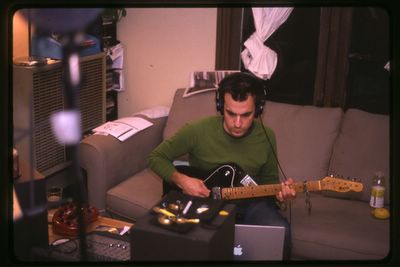
"Eric Fisher Telecaster." Eric Fisher, guitar tracking in
9.Are you going to record and play some shows any time soon?
AC: I spent most of June and the first half of July 2005 recording in
10. Reading what you wrote on political and social issues I guess your take on what is happening in the world right now is similar to mine, but don’t you ever feel that it's difficult to hold on to an independent perception of events in a world that has long lost his?
Not so much. I like learning new things, and I have love, hope and willpower. There are a few principles that I try to live by but I’m also a flexible, open-minded person. Communication, insight and change for the better sometimes requires more listening than talking, more compromise than control. If anything, more people in the world need to believe their voices and talents matter. It is better to have well-informed positions on social and political issues than to give up and let others decide everything for you or for your country and community. Lots of people live passively; either believing nothing substantial will come of their actions or hoping that others will rise to the task of voicing dissent for them. Nothing good happens that way.
Here in the U.S. we’re dealing with the consequences of an unjust war in Iraq, massive flooding and failed disaster relief in New Orleans, Texas & Mississippi, nationwide financial recession, inflation, highest gas prices in 20 years, rampant unemployment, widespread economic and educational disparities, global warming, wars on “Terror” and “Drugs,” and a White House administration hell bent on dominating the world with its narrow-minded agendas. It’s all a fucking mess, but in big and small ways every day, life is what you make it. Participation is fun and interesting. Caring about people, sharing your life with others, and maintaining a sense of humour and curiosity are what makes being alive worth a goddamn. Otherwise, it is nothing but turmoil and doubt. The only way to effect change is to have the heart and the will to create something from that nothing. Perseverance every day.
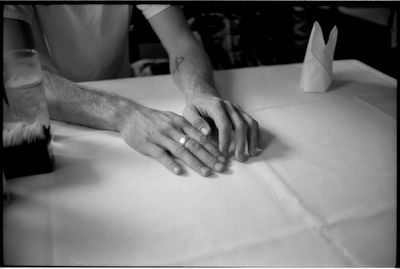
"Arlie Hands."



4 commenti:
solid interview! thank you very very much for posting this!
This is interview is soooo Arlie. Can even picture the faces you were making, dude!
Arlie, is quite an enigma, a cross between a sonwriting jello biafra/punk/anti establishment type of character and that guidance counselor you always believed in.....in some way. I love this guy, great little blogerview, very cool, I know Arlie does not want fame and fortune but he deserves not to struggle and to get his message to the masses, because it is a good message, from a really good guy.
Just promise us when GhstWrz does tour you come back to the middle east in Bean Town
Walker
arlie j i can't help but think you belong in seattle, but then its been years since i known ya.
glad we all grew up ok, some maybe better than others.
Posta un commento